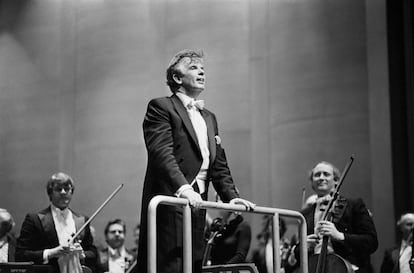Conductor Christoph von Dohnányi, a renovator and guardian of German tradition, dies.

For conductor Christoph von Dohnányi (Berlin, 95), the finest moment in musical history was when Haydn, Mozart, and Beethoven played or conducted their own works. “Music can never be separated from its time, and the great difficulty for performers lies in adapting it to modern ears.” However, he makes no mention of the use of period practices or instruments, which he always considered to be the product of fashion and the market. He summed it up with a lapidary phrase in his book of conversations edited by Klaus Schultz in 2010 : “Learning from history, yes; restoring it, no.”
Dohnányi died last Saturday, September 6, in Munich, two days before his 96th birthday, his third wife, violinist Barbara Koller, informed the German news agency Deutsche Presse-Agentur . Various age-related health problems had severely limited his ability to conduct since 2010, although he continued to make sporadic appearances until the outbreak of the coronavirus pandemic. He conducted his last concerts at the age of 90 with the NDR Orchestra at the Elbphilharmonie in Hamburg on January 17 and 18, 2020 .

He was born in 1929 into a Hungarian family with a deep musical tradition: his grandfather was the composer Ernő Dohnányi. He grew up in the German capital in the years leading up to World War II, greatly influenced by the concerts he heard from Wilhelm Furtwängler conducting the Berlin Philharmonic. However, Nazism changed his life. His father, the jurist Hans von Dohnányi, and his uncle, the Lutheran pastor Dietrich Bonhoeffer, key figures in the resistance against Hitler, were arrested by the Gestapo in 1943 and executed in concentration camps.
The young Dohnányi decided to follow in his father's footsteps and studied law after the war. However, his inclination for composition led him to dedicate himself to conducting, which he studied in Munich with Hans Rosbaud. In 1951, he won the Richard Strauss Prize and, after a brief stay in the United States with his grandfather, began his career as assistant to Georg Solti in Frankfurt, where he premiered a ballet of his own. From 1957, he continued his career in smaller centers such as Lübeck and Kassel, making him the youngest music director in Germany. In 1968, he was appointed music director of the Frankfurt Opera, to which he added artistic directorship in 1972.
We are talking about a man of the theater, as Rupert Schöttle defines him in his book on contemporary conductors . Dohnányi premiered two operas by Hans Werner Henze in Berlin and Salzburg, and his recording of Der junge Lord for Deutsche Grammophon in 1967 marked his first recording. Within a few years, he transformed the Frankfurt Opera into one of the epicenters of cultural change in Germany. With government support from Hilmar Hoffmann and the artistic collaboration of Gerard Mortier , he promoted his vision of opera as a living, non-museum-like art form, which favored the scenic renewal of the Regietheater alongside young playwrights such as Peter Mussbach, Volker Schlöndorff, and Hans Neuenfels . In 1977, he continued this work as head of the Hamburg State Opera, in collaboration with August Everding.
But he left Germany in 1984, partly disenchanted with the artistic state of opera houses. He agreed to become the sixth principal conductor of the Cleveland Orchestra , succeeding George Szell and Lorin Maazel, who had built the Ohio Symphony Orchestra into one of the finest in the world. This new position decisively boosted his discography. Associated with labels such as Teldec, Telarc, and Decca, and taking advantage of the acoustics of Severance Hall, he recorded complete symphonies by Beethoven, Brahms, and Schumann, as well as notable versions of Schubert, Mendelssohn, Bruckner, Tchaikovsky, Dvořák, and Richard Strauss. He also recorded rarities such as Busoni's monumental Concerto for Piano, Orchestra, and Male Chorus , and left admirable interpretations of Bartók and the entire orchestral works of Anton Webern.
These recordings reflect his characteristic musical approach—precise, elegant, and analytical—with which he renewed the German conducting tradition without renouncing its essential values. In Beethoven, Brahms, and Webern, he stands out for his clarity and intellectual acuity, without neglecting the emotional dimension, always using the score as the foundation for his sound choices. His principal orchestra for recording opera was the Vienna Philharmonic, with which he made several landmark recordings for Decca: Beethoven's Fidelio , Strauss's Salome , Berg's Wozzeck , and also Schoenberg's Erwartung , alongside his second wife, the soprano Anja Silja.
In his later years, he was principal conductor of the London Philharmonic Orchestra from 1997 to 2008, with whom he conducted several highly successful opera productions at the Théâtre du Châtelet in Paris. In 2004, he returned to Germany as successor to Günter Wand at the helm of the NDR Elbphilharmonie Orchestra. With this group, he gave his last two performances in Spain, in 2005 and 2008, as part of the Ibermúsica series. His final reflections are captured in several interviews given in 2019, on the occasion of its 90th anniversary , in which he argued that the problem with classical music lies not in the lack of an audience, but in the absence of an effective mediation that explains its value in a society dominated by immediacy and consumerism.
EL PAÍS





%3Aformat(jpg)%3Aquality(99)%3Awatermark(f.elconfidencial.com%2Ffile%2Fbae%2Feea%2Ffde%2Fbaeeeafde1b3229287b0c008f7602058.png%2C0%2C275%2C1)%2Ff.elconfidencial.com%2Foriginal%2F9e1%2F3b9%2F0a0%2F9e13b90a079e2017646a890a80dfc140.jpg&w=3840&q=100)